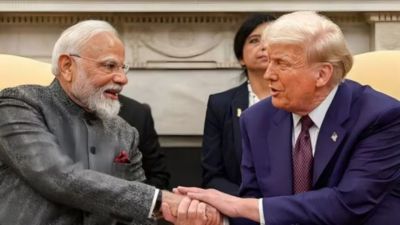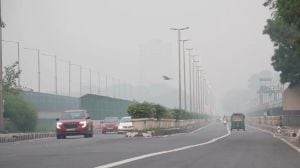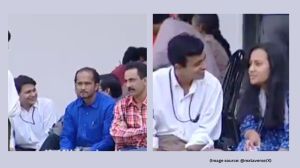Explained: Why the decision to withdraw AFSPA from parts of Northeast is significant
The Act, which gives sweeping powers to the armed forces, has been fully or partially withdrawn from parts of three Northeast states — Assam, Nagaland and Manipur. Why is the decision significant, and why had AFSPA been imposed in the first place?
 AFSPA, which has been called draconian, gives sweeping powers to the armed forces. AP/File
AFSPA, which has been called draconian, gives sweeping powers to the armed forces. AP/FileThe Centre on Thursday significantly reduced the footprint of the Armed Forces Special Powers Act (AFSPA), 1958 in the Northeast, withdrawing it entirely from 23 districts in Assam; and partially from seven districts in Nagaland, six districts in Manipur, and one district in Assam. Once the decision is notified in the gazette, AFSPA remains in force in parts of these three states as well as in parts of Arunachal Pradesh and Jammu & Kashmir.
Why is the decision significant?
AFSPA, which has been called draconian, gives sweeping powers to the armed forces. For example, it allows them to open fire, even causing death, against any person in contravention to the law or carrying arms and ammunition, and gives them powers to arrest individuals without warrants, on the basis of “reasonable suspicion”, and also search premises without warrants. It can be imposed by the Centre or the Governor of a state, on the state or parts of it, after these areas are declared “disturbed’’ under Section 3.
The Northeast has lived under the shadow of AFSPA for nearly 60 years, creating a feeling of alienation from the rest of the country. The move is expected to help demilitarise the region; it will lift restrictions of movements through check points and frisking of residents.
The NDA Govt has been reducing areas under AFSPA in the Northeast for a while now, but this move covers some districts of Nagaland and Manipur that armed forced has red-flagged earlier. It will also help the Centre calm the anger over the Mon killings in Nagaland.
After being in force for many years, why has AFSPA been withdrawn now?
The decision has come as the result of a combination of circumstances.
Over the last two decades, various parts of the Northeast have seen a reduction in insurgencies, some of them up to 60 years old. A number of major groups were already in talks with the Indian government, and these talks received traction during the current regime.
In Nagaland, all major groups — the NSCN(I-M) and Naga National Political Groups (NNPGs) — are at advanced stages of concluding agreements with the government.
In Manipur, insurgency as well as heavy militarisation have been on the decline since 2012, when the Supreme Court started hearing a PIL on extra-judicial killings.
In Nagaland, the killing of 14 villagers in Oting, Mon, is seen as having had a telling impact on reviving the demand to repeal AFSPA.
 Where AFSPA is out, where it remains
Where AFSPA is out, where it remains
Why was AFSPA imposed on the Northeast in the first place?
When the Naga nationalist movement kicked off in the 1950s with the setting up of the Naga National Council — the predecessor of the NSCN — Assam police forces allegedly used force to quell the movement. As an armed movement took root in Nagaland, AFSPA was passed in Parliament, and subsequently imposed on the entire state. “We have been living under the shadow of AFSPA since it was enacted in 1958,” said former Nagaland chief secretary Alemtemshi Jamir, now a Nationalist Democratic Progressive Party (NDPP) leader.
In Manipur, too, it was imposed in 1958 in the three Naga-dominated districts of Senapati, Tamenglong and Ukhrul, where the NNC was active. It was imposed in the 1960s in the Kuki-Zomi dominated Manipur district of Churachandpur, which was under the sway of the Mizo insurgent movement, and extended to the rest of the state in 1979, when groups in the Meitei-dominated Imphal Valley groups began an armed insurgency.
As secessionist and nationalist movements started sprouting in other Northeastern states, AFSPA started being extended and imposed.
What has made AFSPA unpopular among the people?
In Nagaland, 60 years of living under the AFSPA regime has had psychological consequences, trauma and alienation of the people. Former chief secretary Jamir said that while the Naga nationlist movement started peacefully, the use of force and AFSPA furthered the feeling of alienation of the Naga people, solidifying Naga nationalism.
Various incidents of violence have been recorded in the Northeastern states, as AFSPA gives sweeping powers to security forces. In a writ petition filed in the Supreme Court in 2012, the families of victims of extra-judicial killings alleged 1,528 fake encounters had taken place in the state from May 1979 to May 2012. The Supreme Court set up a commission to scrutinise six of these cases, and the commission found all six to be fake encounters.
Reduction in areas under AFSPA is a result of the improved security situation and fast-tracked development due to the consistent efforts and several agreements to end insurgency and bring lasting peace in North East by PM @narendramodi government.
— Amit Shah (@AmitShah) March 31, 2022
Are there any checks and balances?
While the Act gives powers to security forces to open fire, this cannot be done without prior warning given to the suspect. It says that after apprehension of suspects, the security forces have to hand them over to the local police station within 24 hours. It says the armed forces must act in cooperation with the district administration and not as an independent body.
Have the alleged excesses been investigated, and action taken?
Cases in Nagaland have not been investigated. In Manipur, with the Supreme Court having taken up the extra-judicial killings, the CBI has investigated 39 cases (94 killings) and filed chargesheets in 29 cases. In 7 cases, prosecution has begun, In two cases that involved joint operations of the Assam Rifles and Manipuri Commandos, the Centre has denied permission to investigate the paramilitary force personnel.
What attempts have been made to repeal AFSPA or reduce its area of operation in the past?
In 2000, the activist Irom Sharmila began a hunger strike that would continue for 16 years against AFSPA in Manipur. In 2004, the then central government set up a five-member committee under former Supreme Court Justice Jeevan Reddy, which submitted its report in 2005 recommending the repeal of AFSPA, calling it “highly undesirable”, and saying it had become a symbol of oppression.
Subsequently, the Second Administrative Reforms Commission, headed by Veeerapa Moily, endorsed these recommendations. Former home secretary G K Pillai too supported the repeal of AFSPA. Former home minister P Chidambaram has said that the Act, if not repealed, should at least be amended.
Newsletter | Click to get the day’s best explainers in your inbox
What positions have state governments taken on the law?
While the Act gives powers to the central government to unilaterally take the decision to impose AFSPA, this is usually done informally in consonance with the state government. The Centre takes its decision after having received a recommendation from the state government. There have been instances where the Centre has overruled the state, such as the imposition of AFSPA in Tripura in 1972.
The fight to repeal AFSPA has largely been driven by civil society groups. Until the Oting firing, no state government had openly demanded the repeal of AFSPA from their states. After Oting, the Nagaland Assembly passed a resolution for the first time for repeal of AFSPA. Three chief ministers —Neiphiu Rio of Nagaland, N Biren of Manipur, and Conrad Sangma of Meghalaya — have demanded its repeal.





- 01
- 02
- 03
- 04
- 05


































